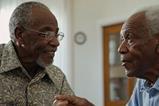Millions of pensioners will lose winter fuel payments, following Labour’s decision to means test it. The Church now has a unique opportunity to alleviate the challenges facing older people in our communities, says Pilgrims’ Friend Society CEO Stephen Hammersley

Do you know an older person who has just lost their winter fuel payment and/or is worried about heating this winter?
It’s likely that you will.
But I wonder if within your family, your church or your wider neighbourhood, you will know the people for whom this is a real blow? Those who now won’t dare to put the heating on even while they shiver because they are terrified of the cost, even if they can afford it? Those who are likely to get ill or fall and end up in hospital because their body is older and frailer and less able to work well when it’s cold?
I’m aware I’m straying into uncomfortable territory. Instinctively, we don’t like to talk about money. It seems rude, not the done thing. For an older person, it can be a matter of pride. They may well have been careful with money all their life and to admit they are struggling now is difficult.
However, in order to protect the vulnerable older people in our communities, I think we as Christians are going to have to be prepared to have some direct conversations. Because if we don’t, there are going to be those who will suffer for lack of help, and that’s just not right.
Awkward questions
As was pointed out by dissenting voices on both sides of parliament during yesterday’s debate, there are currently some 880,000 pensioners who are eligible to receive the pension credit and therefore retain their right to the winter fuel payment but who are not claiming it. Many of them do not realise they qualify. For others, the process is just too complicated. And this is just the tip of the iceberg as Age UK estimated in 2022 that 2.8 million older households live in fuel poverty and so have reason to be worried about staying warm.
Christians are going to have to be prepared to have some direct conversations
Here’s where I think we as the Church can make a difference. We can come alongside those in our midst and through prayer and with gentleness and sensitivity broach the questions that may seem awkward. We can offer to help an individual navigate a confusing application form, or direct them to a citizens’ advice bureau to help find the support they are entitled to.
Combatting loneliness
A study in The Lancet journal of Planetary Health in April 2023 confirmed the intuitively obvious that being cold is a significant cause of death to people over the winter. It may not be too great an exaggeration to say that by reaching out to someone and asking how the withdrawal of the winter fuel payment has affected them you could well be taking a step toward saving their life.
But there’s more to it than that. The Lancet also reports that excess deaths are closely linked to loneliness. God made us all for relationship and those who spend long hours alone are more likely to suffer from the effects of stress, more likely to suffer from serious illness and more likely to take a long time to recover when they are ill.
As the Church, we should be regularly checking in with the older people in our midst, not just those who are in our own families or who are part of our congregations on a Sunday but those who live alongside us as neighbours. To be lonely is a terrible thing and yet there are simple things we can all do to help alleviate this burden – the delivery of a hot meal, an invitation in for a cup of tea and a chat, signposting someone to a local warm bank that holds regular activities for older people.
Working together
I think the government has taken the wrong step as while most comfortably-off pensioners won’t miss it there is too much of a risk that those who are most vulnerable will fall through the cracks. Those who are just above the threshold for eligibility are likely to suffer too. As I wrote in a piece for Premier Christianity last month, if the government is hoping this measure will save costs it is likely to be self-defeating as those who are most vulnerable are more likely to become ill from being too cold and needing hospital treatment, often at great cost.
For our society to really care for older people as it should, we need an approach where both the state and those embedded in local communities work together. The framework Empowering Communities to Care, produced by Pilgrims’ Friend Society and supported by other like-minded organisations, shows examples of ways this can work in practice. Yes, we do need our government to lead the way and make good and wise decisions, and I’ll be continuing to do all that I can to raise my concerns with those in positions of power and influence. But what can be done at a local level, initiated by local people, cannot be underestimated, too.



































No comments yet